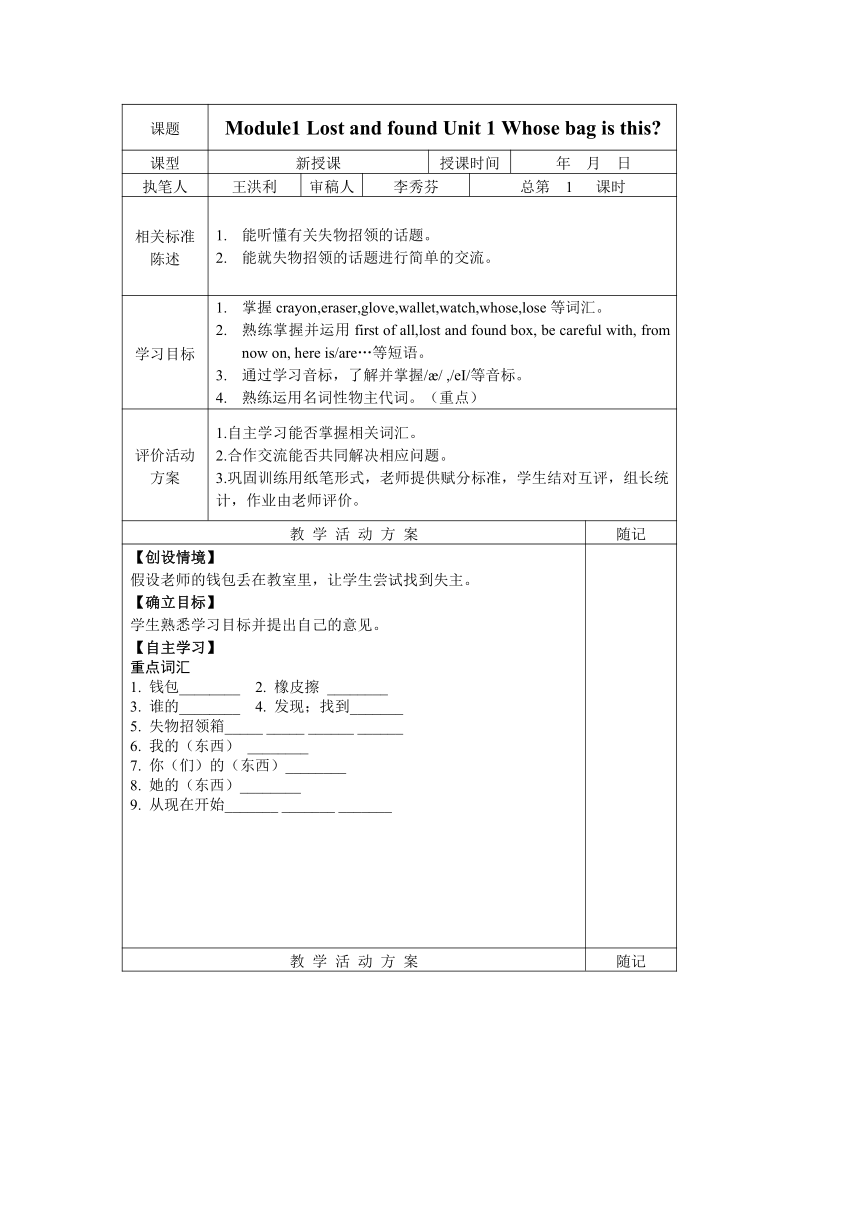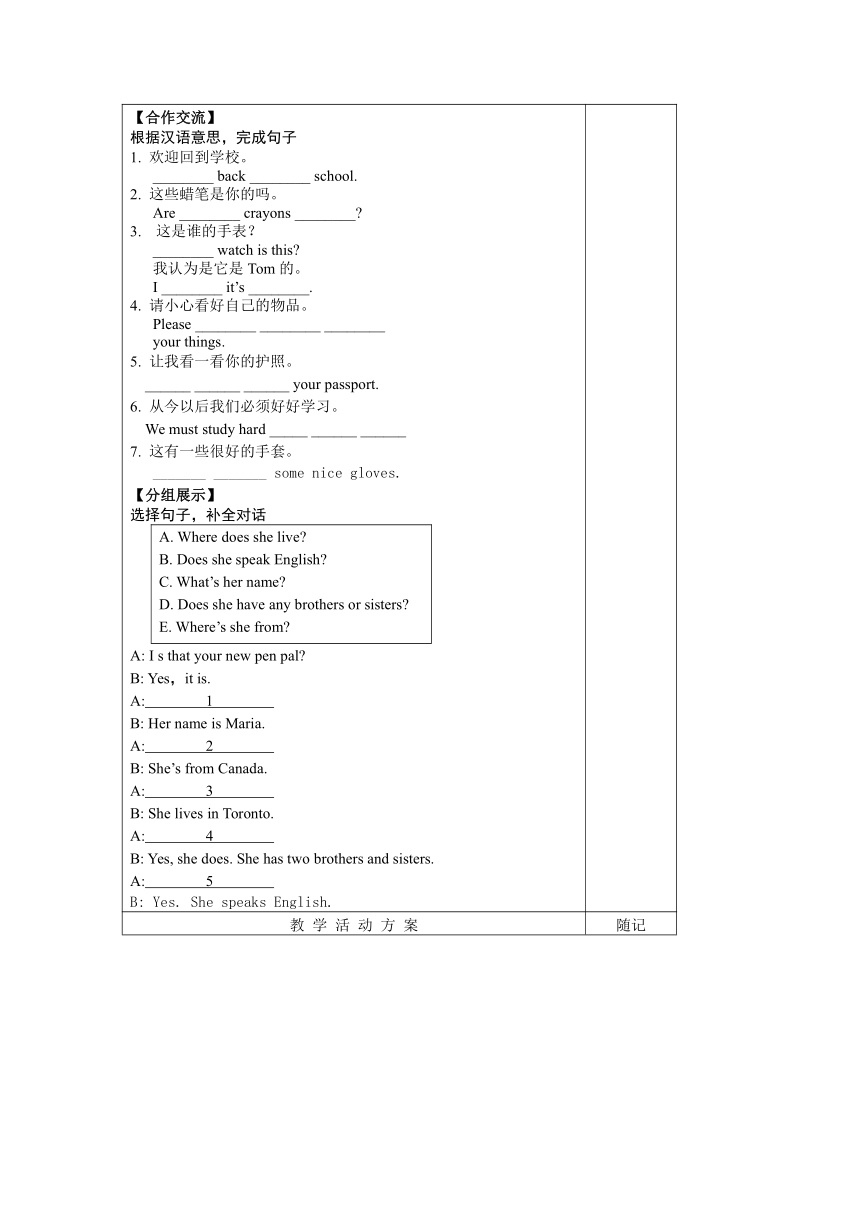Module 1 Lost and found Unit 1 Whose bag is this?教学案
文档属性
| 名称 | Module 1 Lost and found Unit 1 Whose bag is this?教学案 |  | |
| 格式 | zip | ||
| 文件大小 | 17.6KB | ||
| 资源类型 | 教案 | ||
| 版本资源 | 外研版 | ||
| 科目 | 英语 | ||
| 更新时间 | 2013-03-16 12:33:28 | ||
图片预览


文档简介
课题
Module1 Lost and found Unit 1 Whose bag is this?
课型
新授课
授课时间
年 月 日
执笔人
王洪利
审稿人
李秀芬
总第 1 课时
相关标准陈述
能听懂有关失物招领的话题。
能就失物招领的话题进行简单的交流。
学习目标
掌握crayon,eraser,glove,wallet,watch,whose,lose等词汇。
熟练掌握并运用first of all,lost and found box, be careful with, from now on, here is/are…等短语。
通过学习音标,了解并掌握/?/ ,/eΙ/等音标。
熟练运用名词性物主代词。(重点)
评价活动
方案
1.自主学习能否掌握相关词汇。
2.合作交流能否共同解决相应问题。
3.巩固训练用纸笔形式,老师提供赋分标准,学生结对互评,组长统计,作业由老师评价。
教 学 活 动 方 案
随记
【创设情境】
假设老师的钱包丢在教室里,让学生尝试找到失主。
【确立目标】
学生熟悉学习目标并提出自己的意见。
【自主学习】
重点词汇
1. 钱包________ 2. 橡皮擦 ________
3. 谁的________ 4. 发现;找到_______
5. 失物招领箱_____ _____ ______ ______
6. 我的(东西) ________
7. 你(们)的(东西)________
8. 她的(东西)________
9. 从现在开始_______ _______ _______
教 学 活 动 方 案
随记
【合作交流】
根据汉语意思,完成句子
1. 欢迎回到学校。
________ back ________ school.
2. 这些蜡笔是你的吗。
Are ________ crayons ________?
这是谁的手表?
________ watch is this?
我认为是它是Tom的。
I ________ it’s ________.
4. 请小心看好自己的物品。
Please ________ ________ ________
your things.
5. 让我看一看你的护照。
______ ______ ______ your passport.
6. 从今以后我们必须好好学习。
We must study hard _____ ______ ______
7. 这有一些很好的手套。
_______ _______ some nice gloves.
【分组展示】
选择句子,补全对话
A. Where does she live?
B. Does she speak English?
C. What’s her name?
D. Does she have any brothers or sisters?
E. Where’s she from?
A: I s that your new pen pal?
B: Yes,it is.
A: 1
B: Her name is Maria.
A: 2
B: She’s from Canada.
A: 3
B: She lives in Toronto.
A: 4
B: Yes, she does. She has two brothers and sisters.
A: 5
B: Yes. She speaks English.
教 学 活 动 方 案
随记
【解疑释惑】
老师对学生存在的问题进行解疑释惑
“ welcome (back) to +地点名词”表示“欢迎回到某地来”。
everyone不定代词,意为“每个人”,常见的不定代词还有:somebody, someone, anyone, anybody, nobody, no one, something, anything,nothing,everything。形容词修饰不定
代词时,要放在不定代词之后。
whose代词,意为“谁的”,一般用于提问物品的所有者。
Whose flowers are these?
这些是谁的花?
be careful with 小心……
be careful to do sth.小心做某事
from now on 从现在起
【巩固训练】
根据句意及首字母提示写单词
1. Dad givess me a new baseball g________
2. I lose my w________ so I don’t have any money now.
3. Be c________! The car is coming.
4. Tony takes some photos with a new c______
5. —Thank you! —You are. w________
6. —W_____ do you like apples?
—Because they are delicious.
7.Tom goes to school in a h______.
教 学 活 动 方 案
随记
【拓展提升】阅读理解
If you travel to some towns in India,you will be lucky enough to be waited on by guides(向导)—monkeys. These monkeys are always ready to help you. When you are hungry,you only have to point at your own stomach and they will show you to a restaurant. If you are tired,you put your hands behind your head and the monkeys will take you to a hotel. Do not feel surprised(惊奇),when they put their hands in front of you after they have helped you. They just hope you can give them a little money as a tip(小费). After you have given them the money,they will wave their hands to say goodbye.
Believe it or not,these monkeys are graduates(毕业生) of the School for Monkeys in India. They were trained(训练) there for one year. These monkey students are not the only ones in the world. Some monkeys are now being trained as nurses in an American medical college. These monkeys,after they have graduated from the school,will look after patients who are ill in the bed and help get the things they need from their homes.
1. What do the monkeys do in some town in India?
A. They speak English.B. They wait for your food.
C. They work as guides.D. They welcome you.
2. How can the monkeys tell where you want to go and what you want to do?
A. They can understand what you say.
B. A guide tells them what to do.
C. They know the way people speak.
D. They can guess from your body language.
3. Where are these monkeys from?
A. From a mountain. B. From a special school for monkeys.
C. From a medical college. D. From some men's homes.
4. What are some monkeys trained for in America?
A. To help all the people in a hospital.
B. To cook meals for the patients.
C. To look after patients who can't get out of bed.
D. To help patients cross the road.
【作业布置】用所给单词的正确形式填空
1. Your ruler is longer than________(my)
2. —What are they doing?
—They ________(play) basketball.
3. There are many things in the________(lose) and________(find) box.
4. —________(who) bag is this?
—It’s ________(she).
5. Lingling likes_______(do) housework.
Module1 Lost and found Unit 1 Whose bag is this?
课型
新授课
授课时间
年 月 日
执笔人
王洪利
审稿人
李秀芬
总第 1 课时
相关标准陈述
能听懂有关失物招领的话题。
能就失物招领的话题进行简单的交流。
学习目标
掌握crayon,eraser,glove,wallet,watch,whose,lose等词汇。
熟练掌握并运用first of all,lost and found box, be careful with, from now on, here is/are…等短语。
通过学习音标,了解并掌握/?/ ,/eΙ/等音标。
熟练运用名词性物主代词。(重点)
评价活动
方案
1.自主学习能否掌握相关词汇。
2.合作交流能否共同解决相应问题。
3.巩固训练用纸笔形式,老师提供赋分标准,学生结对互评,组长统计,作业由老师评价。
教 学 活 动 方 案
随记
【创设情境】
假设老师的钱包丢在教室里,让学生尝试找到失主。
【确立目标】
学生熟悉学习目标并提出自己的意见。
【自主学习】
重点词汇
1. 钱包________ 2. 橡皮擦 ________
3. 谁的________ 4. 发现;找到_______
5. 失物招领箱_____ _____ ______ ______
6. 我的(东西) ________
7. 你(们)的(东西)________
8. 她的(东西)________
9. 从现在开始_______ _______ _______
教 学 活 动 方 案
随记
【合作交流】
根据汉语意思,完成句子
1. 欢迎回到学校。
________ back ________ school.
2. 这些蜡笔是你的吗。
Are ________ crayons ________?
这是谁的手表?
________ watch is this?
我认为是它是Tom的。
I ________ it’s ________.
4. 请小心看好自己的物品。
Please ________ ________ ________
your things.
5. 让我看一看你的护照。
______ ______ ______ your passport.
6. 从今以后我们必须好好学习。
We must study hard _____ ______ ______
7. 这有一些很好的手套。
_______ _______ some nice gloves.
【分组展示】
选择句子,补全对话
A. Where does she live?
B. Does she speak English?
C. What’s her name?
D. Does she have any brothers or sisters?
E. Where’s she from?
A: I s that your new pen pal?
B: Yes,it is.
A: 1
B: Her name is Maria.
A: 2
B: She’s from Canada.
A: 3
B: She lives in Toronto.
A: 4
B: Yes, she does. She has two brothers and sisters.
A: 5
B: Yes. She speaks English.
教 学 活 动 方 案
随记
【解疑释惑】
老师对学生存在的问题进行解疑释惑
“ welcome (back) to +地点名词”表示“欢迎回到某地来”。
everyone不定代词,意为“每个人”,常见的不定代词还有:somebody, someone, anyone, anybody, nobody, no one, something, anything,nothing,everything。形容词修饰不定
代词时,要放在不定代词之后。
whose代词,意为“谁的”,一般用于提问物品的所有者。
Whose flowers are these?
这些是谁的花?
be careful with 小心……
be careful to do sth.小心做某事
from now on 从现在起
【巩固训练】
根据句意及首字母提示写单词
1. Dad givess me a new baseball g________
2. I lose my w________ so I don’t have any money now.
3. Be c________! The car is coming.
4. Tony takes some photos with a new c______
5. —Thank you! —You are. w________
6. —W_____ do you like apples?
—Because they are delicious.
7.Tom goes to school in a h______.
教 学 活 动 方 案
随记
【拓展提升】阅读理解
If you travel to some towns in India,you will be lucky enough to be waited on by guides(向导)—monkeys. These monkeys are always ready to help you. When you are hungry,you only have to point at your own stomach and they will show you to a restaurant. If you are tired,you put your hands behind your head and the monkeys will take you to a hotel. Do not feel surprised(惊奇),when they put their hands in front of you after they have helped you. They just hope you can give them a little money as a tip(小费). After you have given them the money,they will wave their hands to say goodbye.
Believe it or not,these monkeys are graduates(毕业生) of the School for Monkeys in India. They were trained(训练) there for one year. These monkey students are not the only ones in the world. Some monkeys are now being trained as nurses in an American medical college. These monkeys,after they have graduated from the school,will look after patients who are ill in the bed and help get the things they need from their homes.
1. What do the monkeys do in some town in India?
A. They speak English.B. They wait for your food.
C. They work as guides.D. They welcome you.
2. How can the monkeys tell where you want to go and what you want to do?
A. They can understand what you say.
B. A guide tells them what to do.
C. They know the way people speak.
D. They can guess from your body language.
3. Where are these monkeys from?
A. From a mountain. B. From a special school for monkeys.
C. From a medical college. D. From some men's homes.
4. What are some monkeys trained for in America?
A. To help all the people in a hospital.
B. To cook meals for the patients.
C. To look after patients who can't get out of bed.
D. To help patients cross the road.
【作业布置】用所给单词的正确形式填空
1. Your ruler is longer than________(my)
2. —What are they doing?
—They ________(play) basketball.
3. There are many things in the________(lose) and________(find) box.
4. —________(who) bag is this?
—It’s ________(she).
5. Lingling likes_______(do) housework.
同课章节目录
- Module 1 Lost and found
- Unit 1 Whose bag is this?
- Unit 2 Are they yours?
- Unit 3 Language in use
- Module 2 What can you do ?
- Unit 1 I can play the piano
- Unit 2 I can run really fast
- Unit 3 Language in use
- Module 3 Making plans
- Unit 1 What are you going to do at the weekends?
- Unit 2 We're going to cheer the players.
- Unit 3 Language in use
- Module 4 Life in the future
- Unit 1 Everyone will study at home
- Unit 2 Every family will have a small plane.
- Unit 3 Language in use
- Module 5 Shopping
- Unit 1 What can I do for you?
- Unit 2 You can buy everything on the Internet
- Unit 3 Language in use
- Module 6 Around town
- Unit 1 Could you tell me how to get to the Nationa
- Unit 2 The London Eye is on your right.
- Unit 3 Language in use
- Revision module A
- Module 7 My past life
- Unit 1 I was born in a small village.
- Unit 2 I was born in Quincy.
- Unit 3 Language in use
- Module 8 Story time
- Unit 1 Once upon a time….
- Unit 2 Goldilocks hurried out of the house.
- Unit 3 Language in use
- Module 9 Life history
- Unit 1 He left school and began work at the age of
- Unit 2 He decided to be an actor.
- Unit 3 Language in use
- Module 10 A holiday journey
- Unit 1 What did you do?
- Unit 2 This morning we took a walk.
- Unit 3 Language in use
- Module 11 Body language
- Unit 1 They touch noses!
- Unit 2 Here are some ways to welcome them.
- Unit 3 Language in use
- Module 12 Western music
- Unit 1 It's so beautiful!
- Unit 2 Vienna is the centre of European classical
- Unit 3 Language in use
- Revision module B
